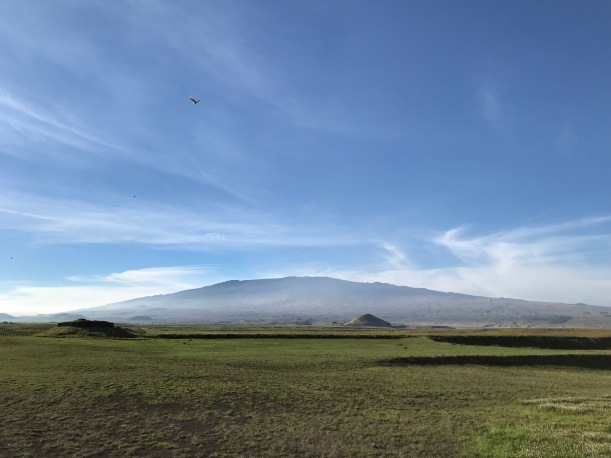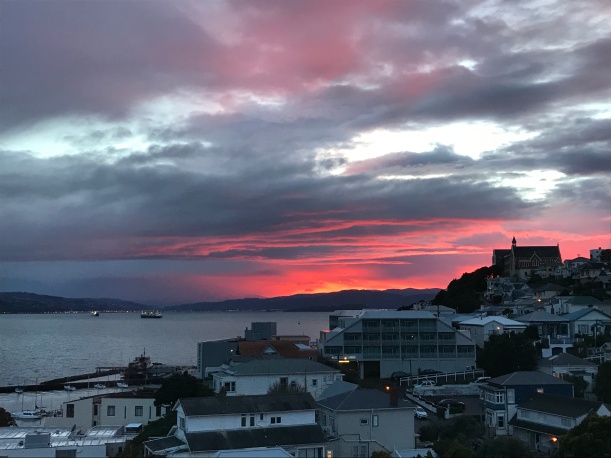
- Know that the mauna is not just a mauna; it is everything. It is our past and our future being woven together in the present, standing tall. It is who we are.
- The next time you pass a mountain, a hill, a river, or a stream, stop, greet them, thank them, recognize them. Know that they are not “resources” but ancient beings whose importance is not dictated by how useful they are to us.
- Stand for all sacred places. The more of us standing around the world, the more likely we are to be seen and heard.
- Wear the mauna everyday. Wear mauna-inspired t-shirts, shawls, prints, earrings, hats, beanies. Be reminded of the mauna every time you catch a glimpse of your reflection. Use your clothing to start discussions, to prompt questions, to inspire solidarity.
- Love the mauna. Know that love is one of the most powerful social forces. Know that it can change worlds.
- Know that the use of military force against people protecting space is an ongoing act of violence, not just physical violence, but a violence that seeks to harm us spiritually, psychologically, culturally, and ancestrally. It is a violence that seeks to destroy us. Recognize this violence and call it out. Make it visible. Make it known.
- Where ever you are, put your hands to soil. Feel the earth pulse. Know that it is alive and that it is this life that we stand to protect.
- Hold a sign. Be a sign.
- Listen to mauna music. Hāwane Rios’ album will soothe you, inspire you, make you stand like the mauna.
- Call a kiaʻi and let them know you’re with them, in heart, in spirit, in song, in prayer. Give them your energy and your strength.
- Give money. Donate to funds established to bail out any kiaʻi who are arrested for being protectors. Donate funds to help the petitioners who work tirelessly and endlessly. Give what you can.
- Learn a chant about the mauna and chant it wherever you are. The vibrations of your voice will travel to the piko, to the summit.
- Just say the words “Kū Kiaʻi Mauna.” They will put a fire in your belly.
- Write. Write. Write. Put words to these movements and these moments. Then share those words with friends. Read them out loud. Let them get spread widely. Put words to feelings and experiences that people may not yet have words for. Know how powerful they can be.
- Pray. Do not underestimate the power of intention.
- Know that “science” is strategically used to justify destruction and desecration and that “for the betterment of humankind” is one of the most dangerous phrases used in colonial contexts.
- Refuse to allow your spaces and your peoples to be sacrifice zones: zones deemed not important enough to protect but important enough to sacrifice “for the rest of the world.”
- Be aware of insidious rhetoric meant to trick you. Do not allow anyone to tell you that we are living in the past; that our structures are not old and therefore can be dismantled and destroyed; that we are afraid of progress; that we are anti-science, that we are selfish. Do not believe any of it.
- Use your voice. Be creative. Seek new and interesting ways to spread the word, to educate, to impact. Write poems. Create art. Print stickers and badges. Sell them and donate the proceeds.
- Send letters to politicians, to the University of Hawaiʻi, to anyone who is involved in the construction of the TMT. And if they don’t listen, post your letters online, make them open letters for everyone to see. Hold our so-called “leaders” accountable.
- Educate yourself and educate others. Learn about colonialism and settler colonialism so that you can recognize their tactics and call them out.
- If you’re given a platform to speak, speak about the mauna.
- Teach others how to put their pointer fingers and thumbs together to form a triangle. Teach them how to lift that triangle to the sky. Tell them that they are creating the mauna, giving it presence anywhere and everywhere in the world.
- Never lose hope. Even when the world tries to tell you that having hope is useless, or that change is impossible, be radical and hope anyway.
- Know that when we stand, we stand as thousands, with generations of ancestors at our sides.
- Do not ever believe that you can’t help, or that you are too small or too distant to have impact. One voice raised in defense of the mauna is one more voice added to the collective, making it stronger, making it pulse deeper, making it ring louder. Know that those who want to construct telescopes on our mauna are depending on our feeling small, feeling helpless, feeling defeated. Do not give them that. Ever.
- Let the movement transform you. Let it teach you how to live better, how to love deeper, how to stand taller in the wisdom of your ancestors.
- Learn stories about the mauna. Learn the names of all the deities who dwell there. Listen to the stories of those gods and goddesses and know that they are not “myths.” Recognize that the category of “myth” has never served indigenous peoples well and that it has been used to disregard our beliefs and our ways of knowing and being in and with the world. Learn the stories as truths.
- Recognize that you are an ancestor in the making. Be the type of ancestor your descendants can look up to with pride, knowing that you stood for something larger than yourself.
- Aloha ʻāina. Live it. Feel it. Act upon it. Know that it is what we do and who we are. Forever.

